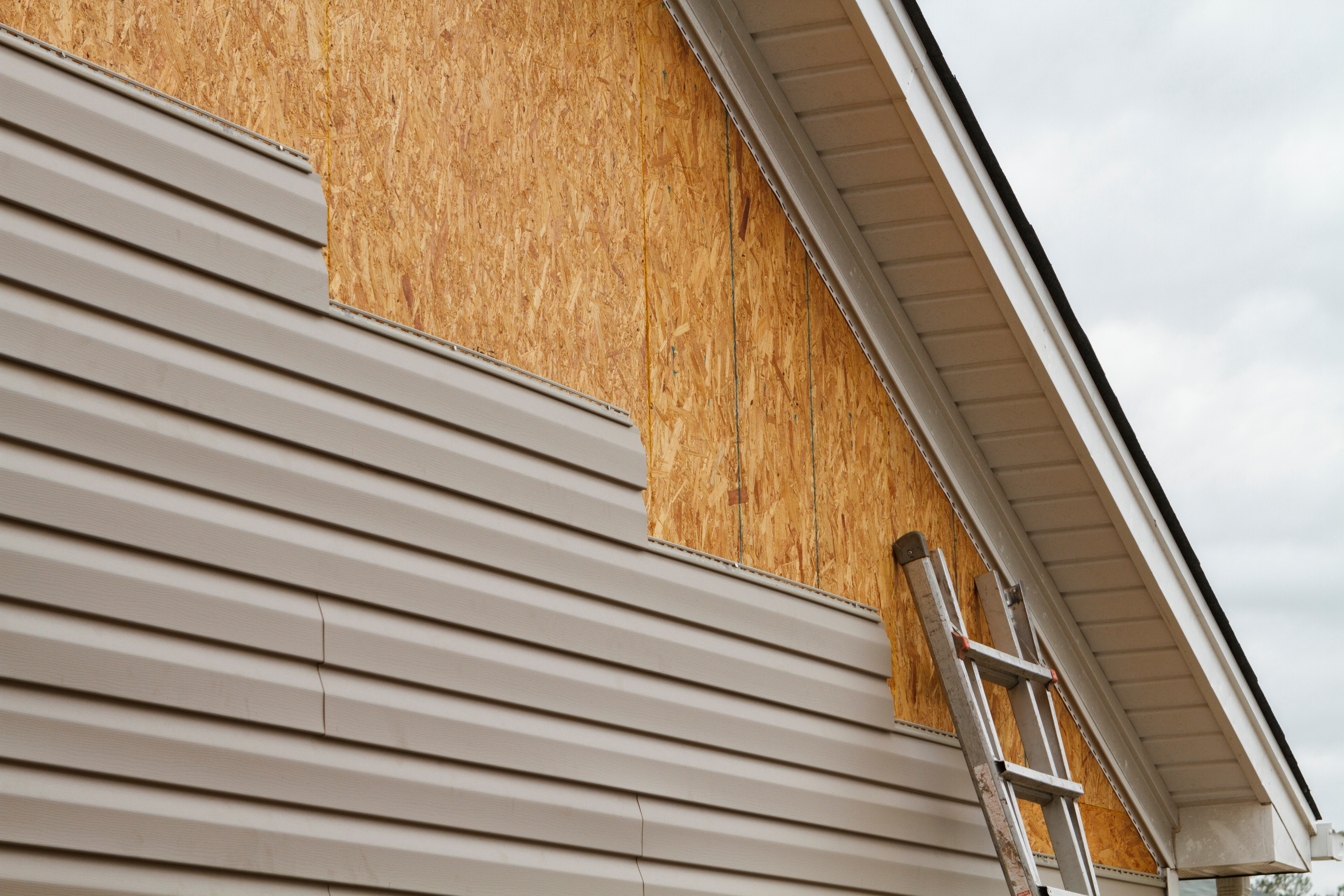
Hiring the Right Contractor: What to Look for When Installing New Siding
Installing new siding on your home is a major investment. Not only does it significantly improve your home’s curb appeal, but it also protects your property from the elements, enhances energy efficiency, and increases its value. However, the quality of your new siding is only as good as the contractor who installs it. Hiring the right siding contractor is crucial to ensuring the job is done correctly, on time, and within your budget. Finding the right contractor can be a daunting task, especially with so many options available. This blog will guide you through the key factors to consider when hiring a siding contractor, including credentials, experience, warranties, and more. By the end, you’ll be well-equipped to make an informed decision and hire the best professional for your siding installation project.
Why Hiring the Right Siding Contractor Matters
Siding is your home’s first line of defense against weather and other external factors. Poor installation can lead to leaks, rot, mold, and reduced energy efficiency, all of which can cause extensive and costly damage. A professional, skilled contractor ensures that your siding is installed correctly, maximizing its lifespan and performance.
Beyond the technical aspects, hiring the right contractor also makes the entire project smoother. A reputable contractor will communicate clearly, stick to deadlines, and provide quality craftsmanship, making your siding installation experience much less stressful. Whether you’re replacing old siding or installing new siding on a newly built home, finding the right contractor is essential.
Key Factors to Consider When Hiring a Siding Contractor
When hiring a siding contractor, there are several critical factors you need to consider to ensure you’re making the best choice for your home and budget. Here are the top things to look for:
Licensing and Insurance
One of the first and most important things to check when hiring a contractor is whether they are properly licensed and insured.
- Licensing: A licensed contractor has met the state’s or local municipality’s requirements for operating a contracting business. This typically includes passing exams, adhering to regulations, and following proper building codes. Always ask for the contractor’s license number and verify it with your local licensing authority to ensure they’re in good standing.
- Insurance: The contractor should carry both liability insurance and workers’ compensation insurance. Liability insurance protects your property in case of damage during the installation process, while workers’ compensation covers the contractor’s employees in case of injury on the job. If the contractor doesn’t have adequate insurance, you could be held liable for accidents or damage that occurs on your property.
By hiring a licensed and insured contractor, you protect yourself from potential legal and financial risks. It also shows that the contractor takes their business seriously and is committed to operating ethically.

Experience and Expertise
Installing siding is a specialized skill, and you want to hire a contractor with extensive experience in siding installation. Contractors who have been in the business for many years are more likely to have the expertise needed to handle a wide range of siding materials, such as vinyl, fiber cement, wood, or aluminum.
How to Assess Experience:
- Ask About Previous Projects: When speaking with potential contractors, ask about their previous siding installation projects. Have they worked on homes similar to yours in terms of size and design? Do they have experience with the specific type of siding you’re interested in?
- Look at Their Portfolio: Reputable contractors should have a portfolio of completed projects that they can share with you. This can give you a sense of their craftsmanship, attention to detail, and the overall quality of their work.
- Ask for References: Don’t hesitate to ask for references from past clients. Speaking with previous customers will give you valuable insights into how the contractor operates, how they handle challenges, and whether they delivered satisfactory results.
The more experience a contractor has with siding installation, the better equipped they are to handle any issues that may arise during your project. They’ll also be more knowledgeable about local building codes and can provide guidance on the best materials for your specific climate and home style.
Reputation and Reviews
In the digital age, a contractor’s reputation is easily accessible through online reviews and testimonials. Checking reviews is a great way to gauge the contractor’s reliability, professionalism, and overall customer satisfaction.
Where to Look for Reviews:
- Google Reviews: Many contractors will have a Google Business Profile, where customers can leave reviews. Look for consistent positive feedback, paying close attention to how the contractor responds to any negative comments.
- Yelp and Angi: Websites like Yelp and Angi (formerly Angie’s List) offer detailed reviews and ratings for local contractors. These platforms often include more in-depth reviews, where customers share their entire experience from start to finish.
- Better Business Bureau (BBB): The BBB is another good resource for checking a contractor’s reputation. The BBB assigns letter grades based on factors such as complaints, customer feedback, and the contractor’s responsiveness to issues. A high BBB rating indicates a reputable business with a history of resolving customer concerns.
A contractor with a solid reputation and plenty of positive reviews is more likely to deliver quality work and a smooth customer experience.

Warranties and Guarantees
Any reputable siding contractor should offer warranties on both materials and workmanship. Warranties provide you with peace of mind, knowing that your investment is protected in case of defects or installation issues.
Types of Warranties to Look For:
- Manufacturer’s Warranty: This covers the siding material itself and typically ranges from 20 years to a lifetime, depending on the product. Make sure you understand the terms of the manufacturer’s warranty, including what is covered (e.g., fading, cracking, or warping) and for how long.
- Workmanship Warranty: In addition to the manufacturer’s warranty, a quality contractor should offer a workmanship warranty that covers any issues resulting from installation errors. This warranty typically lasts anywhere from one to five years, but some contractors may offer longer guarantees. Be sure to get the warranty in writing, so you know exactly what is covered.
Ask the contractor to explain their warranty policies in detail and clarify what actions would void the warranty. For example, some warranties require regular maintenance or prohibit specific cleaning methods, so it’s essential to understand your responsibilities as a homeowner.
Clear and Detailed Estimates
Before starting your siding project, you should receive a clear and detailed estimate from the contractor. The estimate should outline the total cost of the project, including materials, labor, and any additional fees. A vague or incomplete estimate can lead to surprises later on, so it’s crucial to have everything in writing.
What to Look For in an Estimate:
- Material Costs: The estimate should break down the cost of the siding materials. If you’re unsure which material is best, ask the contractor for their recommendations based on your budget, climate, and home style. The estimate should specify the brand and type of siding being used.
- Labor Costs: This includes the cost of installation, as well as any additional services like removing old siding, cleaning the site, or repairing underlying issues.
- Timeline: A professional contractor should provide a timeline for the project, including start and end dates. This helps you plan around the construction and ensures that the contractor sticks to the agreed schedule.
- Additional Fees: Make sure the estimate includes any potential extra fees, such as permit costs, delivery fees, or charges for unforeseen issues like rotted sheathing or structural damage.
Always get multiple estimates from different contractors so you can compare pricing and services. However, don’t automatically go for the lowest bid—sometimes, a low price means cutting corners or using inferior materials. Instead, focus on finding the best value for your money.

Communication and Professionalism
When you’re working with a contractor on a major project like siding installation, communication is key. A good contractor will be responsive, professional, and transparent throughout the entire process. From the initial consultation to the final walkthrough, you should feel comfortable asking questions and receiving timely updates.
Questions to Ask About Communication:
- How will you keep me updated?: Ask the contractor how they will communicate with you throughout the project. Will you receive daily or weekly updates? Will you be notified immediately if any issues arise?
- Who will be my main point of contact?: It’s essential to know who you’ll be communicating with regularly. Some contractors have a dedicated project manager, while others handle everything themselves. Either way, make sure you have a clear point of contact.
- How do you handle delays or unexpected issues?: Construction projects don’t always go as planned, and delays or unforeseen problems can occur. A professional contractor will have a clear process for handling these situations and keeping you informed.
Professionalism is also reflected in how the contractor treats your property. A good contractor will respect your home, keep the worksite clean, and take steps to minimize disruption to your daily life.
Permits and Code Compliance
Siding installation often requires permits and must comply with local building codes. A reputable contractor will be knowledgeable about these regulations and handle the permitting process on your behalf.
What to Ask About Permits:
- Will you handle the permits?: Most professional contractors will take care of obtaining the necessary permits for your siding installation. This ensures that the work is compliant with local laws and avoids any potential fines or legal issues.
- Are you familiar with local building codes?: Each city or county may have specific building codes related to siding installation, such as insulation requirements or fire safety standards. Make sure the contractor is experienced in following these codes to avoid problems down the road.
Failing to obtain the proper permits or adhere to local codes can result in costly delays or having to redo the work. A contractor who handles these details for you demonstrates a high level of professionalism and expertise.

Cleanup and Disposal Services
Siding installation can be a messy job. The removal of old siding, trimming materials, and other debris can create a significant amount of waste. A quality contractor will include cleanup and disposal services as part of their estimate, ensuring that your property is left clean and free of construction debris.
Questions to Ask About Cleanup:
- Will you remove old siding and debris?: Confirm that the contractor will handle the removal of old siding and construction debris. This should be included in the estimate to avoid any surprise fees.
- What steps do you take to protect my landscaping?: Ask the contractor how they plan to protect your landscaping, windows, and other exterior features during the installation process. Reputable contractors will take precautions to minimize damage and clean up thoroughly after the project is complete.
Having a contractor who handles the cleanup saves you the hassle of dealing with a messy worksite and ensures your home looks its best after the siding is installed.
Hiring the right siding contractor can make all the difference in the success of your project. By focusing on factors like licensing, experience, reputation, warranties, and communication, you can ensure that you’re working with a professional who will deliver quality results. Take the time to research potential contractors, ask the right questions, and compare estimates before making your final decision.
